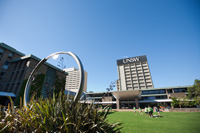This is a shelf course. A shelf course comprises a number of modules related to this broad area of study. Each module is a separate semester of study in this area and is offered in rotation. You can study TWO modules but you cannot study the same module twice.
|
Subject Area: History
Module: "Modern Southeast Asia: 1950-2010"
This course has two goals: understanding the modern histories of Australia's immediate Asian neighbours; and analysing how histories are conceptualised, written and controlled, that is, how our knowledge is shaped by processes of selection and omission, perspective and censorship. Sources include academic and populist histories, documentaries, film, fiction and memoirs. Individual research projects will allow students to study in depth the Southeast Asian country of most interest to them or a theme for comparative analysis of two or more states. Topics include the big issues Southeast Asians grapple with today, such as reappraisal of colonial past, Asian versus Western modernity, state religion versus pluralism of belief, integration versus assimilation of minorities, population planning, and violence in public life.
Module: "The Rise of Modern China, 1842-2011" (Semester 2, 2011)
This course has two goals: understanding the modern history of Australia's largest trading partner; and analysing how histories are conceptualised, written and controlled, that is, how our knowledge is shaped by processes of selection and omission, perspective and censorship. Partuclar emphasis will be placed on how historic narratives of events such as the Tiananmen riots (1989) are formed in either country.
Sources include academic and populist histories, documentaries, film, fiction and memoirs. Individual research projects will allow students to study in depth a theme of most interest to them -- ranging from poetry to warfare. Topics include the big issues China grapples with today, such as reappraisal of the semi-colonial heritage of all-important urban hubs such as Shanghai, Chinese versus Western modernity, state religion versus pluralism of belief, integration versus assimilation of minorities, population planning, and violence in public life.

